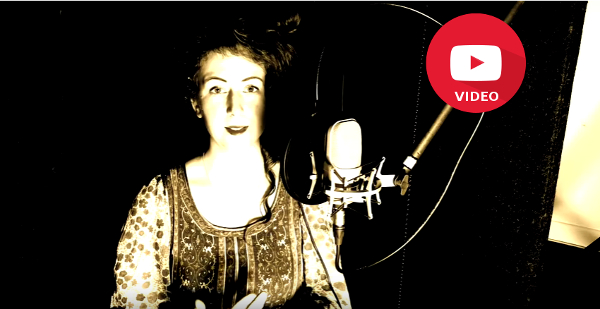It is said that when Ādi Śaṅkara was a young boy of eight and wandering near River Narmada, seeking to find his guru, he encountered the seer Govinda Bhagavatpada who asked him, “Who are you?”. The boy answered with these stanzas, which are known as “Nirvāṇa Ṣaṭkam” or Ātma Ṣaṭkam”. Swami Govindapada accepted Ādi Śaṅkara as his disciple. The verses are said to be valued to progress in contemplation practices that lead to Self-Realization.
“Nirvāṇa” is complete equanimity, peace, tranquility, freedom and joy. “Ātma” is the True Self.
Singer: Gaiea Sanskrit
मनोबुद्ध्यहंकार चित्तानि नाहं न च श्रोत्रजिह्वे न च घ्राणनेत्रे ।
न च व्योम भूमिर्न तेजो न वायुः चिदानन्दरूपः शिवोऽहम् शिवोऽहम् ।
manobuddhyahaṅkāra cittāni nāhaṃ na ca śrotrajihve na ca ghrāṇanetre । na ca vyoma bhūmirna tejo na vāyuḥ cidānandarūpaḥ śivo’ham śivo’ham ॥1॥
न च प्राणसंज्ञो न वै पंचवायुः, न वा सप्तधातुः न वा पञ्चकोशः ।
न वाक्पाणिपादौ न चोपस्थपायु, चिदानन्दरूपः शिवोऽहम् शिवोऽहम् ।। 2 ।।
na ca prāṇasaṃjño na vai pañcavāyuḥ na vā saptadhātuḥ na vā pañcakośaḥ ।
na vākpāṇipādaṃ na copasthapāyu cidānandarūpaḥ śivo’ham śivo’ham ॥2॥
न मे द्वेषरागौ न मे लोभमोहौ, मदो नैव मे नैव मात्सर्यभावः ।
न धर्मो न चार्थो न कामो न मोक्षः, चिदानन्दरूपः शिवोऽहम् शिवोऽहम् ।। 3 ।।)
na me dveṣarāgau na me lobhamohau mado naiva me naiva mātsaryabhāvaḥ ।
na dharmo na cārtho na kāmo na mokṣaḥ cidānandarūpaḥ śivo’ham śivo’ham ॥3॥
न पुण्यं न पापं न सौख्यं न दुःखं, न मन्त्रो न तीर्थो न वेदा न यज्ञ ।
अहं भोजनं नैव भोज्यं न भोक्ता, चिदानन्दरूपः शिवोऽहम् शिवोऽहम् ।। 4 ।।)
na puṇyaṃ na pāpaṃ na saukhyaṃ na duḥkhaṃ na mantro na tīrthaṃ na vedā na yajñāḥ ।
ahaṃ bhojanaṃ naiva bhojyaṃ na bhoktā cidānandarūpaḥ śivo’ham śivo’ham ॥4॥
न मे मृत्युशंका न मे जातिभेदः, पिता नैव मे नैव माता न जन्मः ।
न बन्धुर्न मित्रं गुरूर्नैव शिष्यः, चिदानन्दरूपः शिवोऽहम् शिवोऽहम् ।। 5 ।।)
na mṛtyurna śaṅkā na me jātibhedaḥ pitā naiva me naiva mātā na janmaḥ ।
na bandhurna mitraṃ gururnaiva śiṣyaṃ cidānandarūpaḥ śivo’ham śivo’ham ॥5॥
अहं निर्विकल्पो निराकार रूपो, विभुत्वाच सर्वत्र सर्वेन्द्रियाणाम् ।
न चासङ्गतं नैव मुक्तिर्न मेयः, चिदानन्दरूपः शिवोऽहम् शिवोऽहम् ।। 6 ।।)
ahaṃ nirvikalpo nirākārarūpo vibhutvācca sarvatra sarvendriyāṇām ।
na cāsaṅgataṃ naiva muktirna meyaḥ cidānandarūpaḥ śivo’ham śivo’ham ॥6॥
Meaning:
1) I am not mind, nor intellect, nor ego, nor the reflections of inner self (citta). I am not the five senses. I am beyond that. I am not the seven elements or the five sheaths. I am indeed, That eternal knowing and bliss, the auspicious (Śivam), love and pure consciousness.
2) Neither can I be termed as energy (prāṇa), nor five types of breath (vāyus), nor the seven material essences, nor the five sheaths(pañca-kośa). Neither am I the organ of Speech, nor the organs for Holding ( Hand ), Movement ( Feet ) or Excretion. I am indeed, That eternal knowing and bliss, the auspicious (Śivam), love and pure consciousness.
3) I have no hatred or dislike, nor affiliation or liking, nor greed, nor delusion, nor pride or haughtiness, nor feelings of envy or jealousy. I have no duty (dharma), nor any money, nor any desire (kāma), nor even liberation (mokṣa). I am indeed, That eternal knowing and bliss, the auspicious (Śivam), love and pure consciousness.
4) I have neither merit (virtue), nor demerit (vice). I do not commit sins or good deeds, nor have happiness or sorrow, pain or pleasure. I do not need mantras, holy places, scriptures (Vedas), rituals or sacrifices (yajñas). I am none of the triad of the observer or one who experiences, the process of observing or experiencing, or any object being observed or experienced. I am indeed, That eternal knowing and bliss, the auspicious (Śivam), love and pure consciousness.
5) I do not have fear of death, as I do not have death. I have no separation from my true self, no doubt about my existence, nor have I discrimination on the basis of birth. I have no father or mother, nor did I have a birth. I am not the relative, nor the friend, nor the guru, nor the disciple. I am indeed, That eternal knowing and bliss, the auspicious (Śivam), love and pure consciousness.
6) I am all pervasive. I am without any attributes, and without any form. I have neither attachment to the world, nor to liberation (mukti). I have no wishes for anything because I am everything, everywhere, every time, always in equilibrium. I am indeed, That eternal knowing and bliss, the auspicious (Śivam), love and pure consciousness.
Source: Youtube
You may also like
-
India Can’t Afford to Remain Stagnant at this Juncture, Says PM Modi; Asks People to Buy Locally-Made Goods
-
Stolen Artefacts to be Returned to India from Scotland Museums
-
Legendary Singer Lata Mangeshkar Passes Away At the Age of 92
-
Netaji’s Hologram Statue at India Gate
-
10th Century Stone Idol of Goat Head Yogini IllegallyRemoved from A Temple in Lokhari, Banda, UP Being Returned to India
